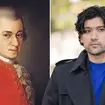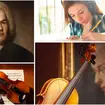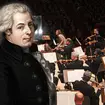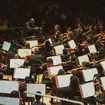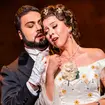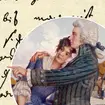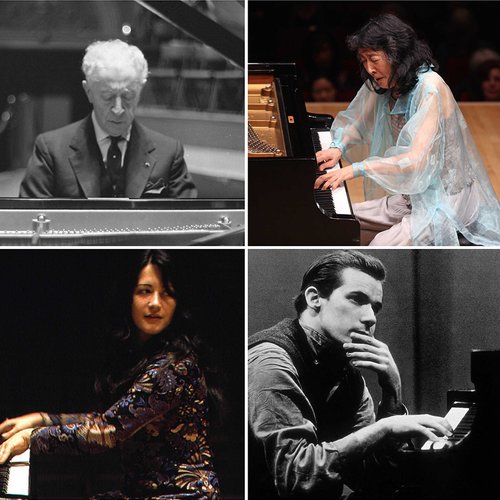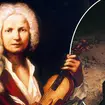Mozart's biography: the tour ends, composing begins (1766 - 1769)
The epic Mozart family tour that dominated so much of Wolfgang's early life finally came to an end - but what was to come next? Compositions, and plenty of them!
1766 - the tour comes to an end
In 1766, far from winding down the tour as they made their way back home, the schedule became ever more punishing. By the time the first signs of summer had arrived in May, Mozart had already played in Utrecht, Amsterdam, Antwerp and Brussels. Leopold’s experiences on tour had been a revelation to him. Back in Salzburg, he was a mere public servant, paid — not a massive amount — to provide music on demand. On the road, the family were received by royalty and treated almost as equals. Just as would be the case for Mozart some years later, Leopold had no burning desire to return to the status quo. So, on 10 May, they revisited Paris. They stayed there for 2 leisurely months and, concerts and receptions aside, behaved like tourists.
Given the warm welcome that the Mozart family received at numerous high-profile events, it’s hardly surprising that Leopold didn’t rush home. He was reluctant to leave Paris, but when the time came, the family travelled to Dijon for another concert, where the 10-year-old Mozart (who was almost certainly an able boy soprano) sang one of his own arias. From there, it was on, via Switzerland, to Munich.
They had first visited Munich at the start of their tour, but that was now 3 years ago. It was then that Mozart had played the organ for the first time, dazzling his audience in the process. This time, arriving on 9 November and staying for just 3 weeks, they probably made an even bigger impression than the last. Mozart was still a boy wonder, but now had 3 years more experience — and 3 years, in Mozart terms, was eons.
Those people who saw him play would have been faced with the double-whammy of him still being a slip of a child (because Mozart was always short, even for his age) and of now being an even more accomplished, more spectacular artist than before. The audiences must have loved it. He was immediately invited to play at court, which he did: first on his own then, after a short illness, with Nannerl. What a time they must have had. What euphoria they must have felt. And how hard must reality have bitten when they finally, on 29 November, hit Salzburg. Mozart’s 3 years on the road had come to an end.
1767 - Salzburg and smallpox
Back in Salzburg, things returned to normal for Leopold. For Mozart himself, there probably was no version of 'normal' to return to. He had been only 7 when they left home and had travelled for much of the year leading up to his grand tour anyway.
On the many trips be shared with his young son, Leopold must have come to know virtually everything there was to know about him. They were forced, on occasions, to share beds, often leading to one or the other of them gating little or no sleep. Leopold’s letters also make a point of noting that the young composer snored.
Eventually Mozart shared his father’s misgivings about Salzburg. But when he was still a child, simply being away from home, very often without one or other of his parents, would have tangibly affected the young composer.
Apart from his sister, Nannerl, Mozart enjoyed very little company of his own age. The fact that he spent his childhood mixing almost exclusively in adult company is one of the reasons many have suggested he took some of the signs of juvenilia into later life with him. Perhaps it was part of being a highly creative individual, but there is no doubt that Mozart kept a part of himself forever young.
The return home allowed Leopold the chance to show Salzburg how his young Wunderkind had improved. Mozart set to work on a cantata entitled Die Schuldigkeit des ersten Gebots. For the words, Mozart looked to a friend of his father’s named Anton Weiser, who was a town councillor and textile merchant in Salzburg. He was an influential man, so the arrangement was probably as much down to diplomacy as it was for aesthetic reasons. The aria was performed at the Archbishop Schrattenbach’s court on 12 April that year, and, much to Leopold’s delight, they received 12 ducats for it. The young Mozart was equally delighted with the golden medal, which was given to him personally.
To be fair to Mozart, he did not have long to find himself a comfortable version of childhood life in Salzburg because, less than 9 months after they had come home, Leopold asked for leave to go back on the road. Schrattenbach agreed and the family set the coordinates for Vienna. Once they arrived, though, they found the city overrun by a smallpox epidemic. Almost as soon as they arrived there, Mozart went down with smallpox, although he had almost certainly contracted it in Vienna. On 26 October, in Olomouc (which was then called Olmütz), Leopold called in a Doctor Wolff and Mozart was ordered to rest for at least a couple of months.
By December, Mozart was a lot better and the family moved on to Brno (then known as Brunn) where, just 4 days after Christmas, Mozart was well enough to give a concert with Nannerl in a tavern in the town. Buoyed by his son’s improvement, and with news that the Austrian capital was once again rid of the disease, Leopold waited just 10 days into the New Year before setting out to Vienna once more. It took the family a further 10 days travelling to get there and they finally arrived on 20 January 1768. Promisingly, the day they arrived, they were immediately received at court.
1768 - Mozart's first opera
During his time in Vienna, Mozart wrote an opera, Lafinta semplice, which translates as “The make-believe idiot”. Leopold tried hard to get the work performed, but to no avail. The rumours circulating about Mozart were getting stronger. While some were saying, as they had always done, that Mozart’s musicality was nothing short of miraculous, others were beginning to doubt that a miracle of this magnitude could occur. A 12-year-old boy? Writing a fully fledged opera? Well, it couldn’t be possible. They believed it must have been the work of Leopold, who was passing off his own compositions as the boy’s to make money! But the live performances that astonished crowds when they witnessed them first hand? How could they be faked? Well, obviously some of the reports were just lies, claimed the detractors. But what about the way he could improvises spectacularly on themes given to him by members of his audience? And the way he could play virtually any piece from sight? Well, clearly, so the rumourmongers would say, these were pulled off with prearranged stooges, in much the same way as cheap conjurers would do. Leopold was furious at the malicious stories being peddled about him and his son:
"These days, people make fun of miracles. They question them. So, you have to put them right."
Leopold could not find anywhere willing to premiere Mozart’s opera, which would have to wait a good year to be heard. It was eventually performed back home in Salzburg. Leopold even, for a time, suspected that the scurrilous accusations might not be genuine scepticism but rather the machinations of jealous fellow composers keen not to be upstaged by a mere boy of 12. He even considered, for a time that it might have been the composer Christoph Willibald von Gluck, plotting against Mozart’s reputation, but there does not appear to be much to back up this theory.
Across the autumn, Mozart wrote his first complete mass, which was performed in the church of a Viennese orphanage in December. The 12-year-old Mozart was himself the conductor of the premiere. From Leopold’s letters, it appears his waiting game was paying off:
"Wolfgang’s Mass, performed on 7th December. the Imperial family in attendance and Wolfgang himself conducting, has repaired the damage our enemies sought to do by blocking the opera, and has convinced both the court and the public — who turned up in droves — of the malevolence of our rivals!"
The mass became known by its venue, Waisenhausmesse, which translates as the 'Orphanage Mass'. Cheered considerably by the emperor’s reception and attendance, Leopold led the clan back home to Salzburg.
1769 - Mozart the Konzertmeister
Little did he know at the outset, but 1769 was going to prove an important year for Mozart. He spent virtually the whole time in Salzburg, which must have felt rather unusual for him. As a result, his compositions were created almost exclusively for Archbishop Schrattenbach’s court and for the adjoining university There was a Missa brevis, performed at Salzburg’s Kollegienkirche, and a mass for Leopold’s landlord, Hagenauer, although dedicated to him in his role as 'Father Domenicus' Hagenauer. Hence, the Domenicus Mass was performed at the abbey church of St Peter, Salzburg, on 15 October.
It was in the autumn, on 27 November to be exact, that Mozart’s world changed, quite considerably. He was given the post of Konzertmeister to the Salzburg court. Although the role came without pay, the significance of this opportunity is hard to overestimate. This was a 13-year-old boy being given the job as a composer and conductor to the prince archbishop of one of the major principalities of the Holy Roman Empire.
Leopold was overjoyed with the appointment, not least because Schrattenbach chose this moment to give Mozart 120 ducats. Leopold knew exactly what Mozart should do with his money, too. Leaving Nannerl at home with her mother, Leopold immediately set about packing bags, firing off letters and organising travel plans. Within 2 weeks, he had Mozart ready to go back on the road, this time as a solo performer. They were going to Italy.
On 13 December 1769, the teenage composer and his dad settled down to a good 2 weeks on the road, the rediscovered novelty of coach travel still a source of excitement for Mozart, if not for his father. Mozart wrote home to his mum barely a week into the journey:
"I feel so happy on this journey. It’s lovely and warm in the carriage, and our driver is a bold chap who drives like the wind whenever the roads allow!"
On 17 December, they stopped at Innsbruck, finding time to play at the house of a local nobleman, Count Kunigl. From there, it was nonstop travelling in the coach for almost 10 days, until the day after Boxing Day, when they arrived safe and well in Verona. Mozart’s Italian Adventure had begun.
Discover: Mozart's biography: early operas and Italy (1770-1773)



